Related Research Articles

Jude the Obscure is a novel by Thomas Hardy, which began as a magazine serial in December 1894 and was first published in book form in 1895. It is Hardy's last completed novel. The protagonist, Jude Fawley, is a working-class young man; he is a stonemason who dreams of becoming a scholar. The other main character is his cousin, Sue Bridehead, who is also his central love interest. The novel is concerned in particular with issues of class, education, religion, morality and marriage.

Jude is a 1996 British period drama film directed by Michael Winterbottom, and written by Hossein Amini, based on Thomas Hardy's 1895 novel Jude the Obscure. The original music score was composed by Adrian Johnston.

Harold Arlen was an American composer of popular music, who composed over 500 songs, a number of which have become known worldwide. In addition to composing the songs for the 1939 film The Wizard of Oz, including "Over the Rainbow", which won him the Oscar for Best Original Song, he was nominated as composer for 8 other Oscar awards. Arlen is a highly regarded contributor to the Great American Songbook. "Over the Rainbow" was voted the 20th century's No. 1 song by the RIAA and the NEA.

The Scarecrow is a character in the fictional Land of Oz created by American author L. Frank Baum and illustrator W.W. Denslow. In his first appearance, the Scarecrow reveals that he lacks a brain and desires above all else to have one. In reality, he is only two days old and merely naïve. Throughout the course of the novel, he proves to have the brains he seeks and is later recognized as "the wisest man in all of Oz," although he continues to credit the Wizard for them. He is, however, wise enough to know his own limitations and all too happy to hand the rulership of Oz to Princess Ozma and become one of her trusted advisors, though he typically spends more time having fun than advising.
Esther Louise Forbes was an American novelist, historian and children's writer who received the Pulitzer Prize and the Newbery Medal. She was the first woman elected to membership in the American Antiquarian Society.

Kafka on the Shore is a 2002 novel by Japanese author Haruki Murakami. Its 2005 English translation was among "The 10 Best Books of 2005" from The New York Times and received the World Fantasy Award for 2006. The book tells the stories of the young Kafka Tamura, a bookish 15-year-old boy who runs away from his Oedipal curse, and Satoru Nakata, an old, disabled man with the uncanny ability to talk to cats. The book incorporates themes of music as a communicative conduit, metaphysics, dreams, fate, and the subconscious.
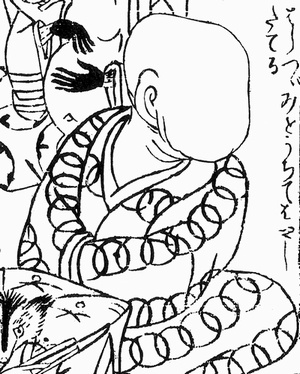
The noppera-bō (のっぺらぼう) or 野箆坊, or faceless ghost, is a Japanese yōkai that looks like a human but has no face. They are sometimes mistakenly referred to as a mujina, an old Japanese word for a badger or raccoon dog. Although the mujina can assume the form of the other, noppera-bō are usually disguised as humans. Such creatures were thought to sometimes transform themselves into noppera-bō in order to frighten humans. Lafcadio Hearn used the animals' name as the title of his story about faceless monsters, probably resulting in the misused terminology.

Margaret Hale is the heroine of Elizabeth Gaskell's 1855 novel North and South. Initially, Gaskell wanted the title of the novel to be Margaret Hale, but Charles Dickens, the editor of Household Words, the magazine in which the novel was serialized, insisted on North and South.

Finian's Rainbow is a 1968 American musical fantasy film directed by Francis Ford Coppola and adapted by E. Y. Harburg and Fred Saidy from the 1947 stage musical of the same name. It stars Fred Astaire, Petula Clark, and Tommy Steele. The plot follows an Irishman and his daughter, who steal a leprechaun's magic pot of gold and emigrate to the American South, where they become involved in a dispute between rural landowners and a greedy, racist U.S. senator.
The Crow is a superhero and the protagonist of The Crow comic book series, originally created by American artist James O'Barr in 1989. The titular character is an undead vigilante brought back to life by a supernatural crow to avenge his murder and death of his fiancée.
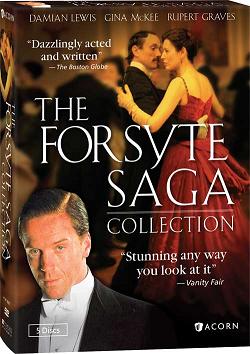
The Forsyte Saga is a British drama television serial that chronicles the lives of three generations of an upper-middle-class family from the 1870s to 1920s. It was based on the books of John Galsworthy's trilogy The Forsyte Saga, which were adapted by Granada Television for the ITV network in 2002 and 2003. Additional funding was provided by American PBS station WGBH, as the 1967 BBC version had been a success on PBS in the early 1970s.

The Wicked Witch of Oz is a novel by Rachel Cosgrove Payes. Written in the early 1950s but not published until four decades later in 1993, the book is an unofficial entry in the series of Oz books by L. Frank Baum and his successors.
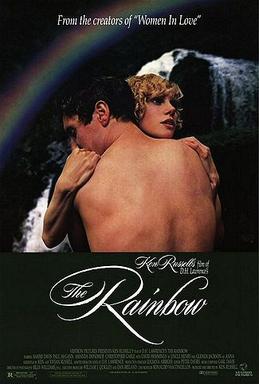
The Rainbow is a 1989 British drama film co-written and directed by Ken Russell and adapted from the D. H. Lawrence novel The Rainbow (1915). Sammi Davis stars as Ursula, a sheltered young pupil, then schoolteacher, who is taken under the wing by the more sophisticated Winifred.
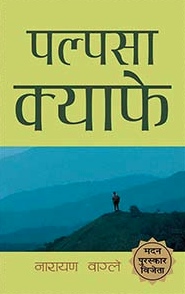
Palpasa Cafe is a novel by Nepali author Narayan Wagle. It tells the story of an artist, Drishya, during the height of the Nepalese Civil War. The novel is partly a love story of Drishya and the first generation American Nepali, Palpasa, who has returned to the land of her parents after 9/11. It is often called an anti-war novel, and describes the effects of the civil war on the Nepali countryside that Drishya travels to.

The Being Human novels are a series of three fantasy novels written by Simon Guerrier, Mark Michalowski and James Goss. The novels are based on the British television series Being Human, created by Toby Whithouse.
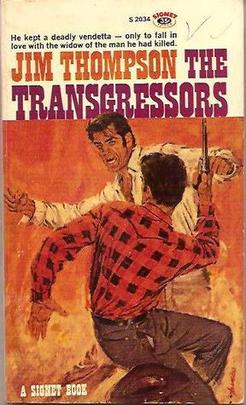
The Transgressors is a crime novel by Jim Thompson, published in 1961. It is one of a very few Thompson novels to feature a traditional love story as a major part of the plot where the lovers have a happy ending together rather than one murdering or betraying the other as is the norm in most of Thompson's novels. As with most of Thompson's novels it takes place in the Southwest (Texas) where Thompson grew up and it leverages Thompson's diverse life experiences in creating the characters and situations in a community dominated by the oil industry.
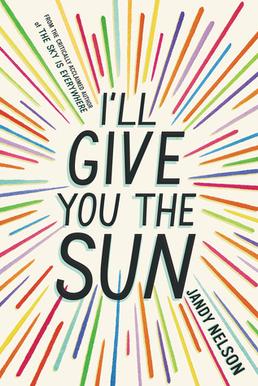
I'll Give You the Sun is a young adult novel by author Jandy Nelson. Published in September 2014, it is Nelson's second novel. Nelson won several awards for this novel, including the 2015 Printz Award for Excellence in Young Adult Literature. In June 2015, Warner Bros. optioned the movie rights and Natalie Krinsky signed on to write the script. Denise Di Novi and Alison Greenspan were said to be producing the movie.
Come On, Jeeves is a comedic play co-written by Guy Bolton and P. G. Wodehouse. The play was written in the summer of 1952, and toured the English provinces in the summer of 1954. Wodehouse adapted the play into the novel Ring for Jeeves, which was first published in April 1953, a year before the play reached production. Come On, Jeeves is still occasionally produced and was presented as recently as December 2017.
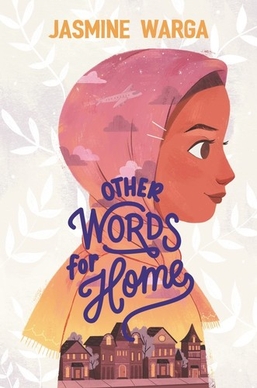
Other Words for Home is a 2019 free verse children's book by Jasmine Warga. The story is about a family of Syrian refugees with Jude, a 12-year-old girl, as protagonist. The book won a 2020 Newbery Honor.
References
- ↑ "Books: Ye Olde New England". Time Magazine (February 1, 1954). Archived from the original on March 3, 2001.